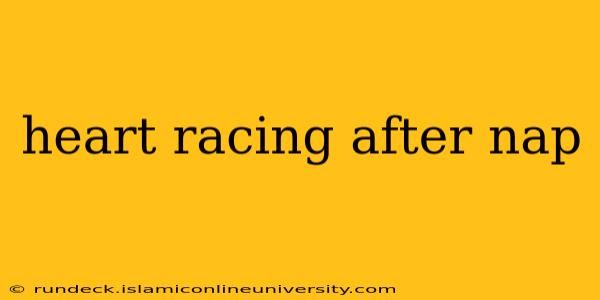Many people enjoy a refreshing afternoon nap, but sometimes, waking up with a racing heart can be alarming. Experiencing palpitations or a rapid heartbeat after a nap isn't necessarily a cause for immediate panic, but understanding the potential reasons behind it is crucial. This article explores various factors that can contribute to this phenomenon, offering insights into when it's a normal occurrence and when it warrants medical attention.
Why Does My Heart Race After a Nap?
Several factors can trigger a racing heart after a nap. These range from benign physiological responses to underlying health conditions. Let's delve into some common culprits:
1. Sleep Apnea:
Sleep apnea, characterized by pauses in breathing during sleep, can cause your heart to work harder to compensate for oxygen deprivation. The resulting stress on your cardiovascular system can lead to a rapid heartbeat upon waking. This is particularly true if you've experienced restless or disrupted sleep due to apnea.
2. Caffeine or Nicotine Consumption:
Even if you consumed caffeine or nicotine hours before your nap, their effects might still linger. These stimulants can elevate your heart rate and keep your nervous system in a heightened state, leading to palpitations even after a period of rest.
3. Dehydration:
Dehydration can impact your body's circulatory system, causing your heart to beat faster to maintain adequate blood flow. This effect can be amplified after a nap, as your body might be slightly dehydrated from several hours without fluid intake.
4. Anxiety or Stress:
Even if you felt relaxed before your nap, underlying anxiety or stress can manifest physically during periods of rest. This can result in a heightened physiological response, including an increased heart rate upon waking.
5. Medication Side Effects:
Certain medications, such as decongestants or asthma inhalers, can list increased heart rate as a possible side effect. This effect may be more noticeable after a nap due to the combination of medication and rest.
6. Positional Changes:
Sometimes, the simple act of changing positions from lying down to sitting or standing can cause a temporary increase in heart rate. This is a relatively common and generally harmless occurrence.
Is a Racing Heart After a Nap Serious?
While a racing heart after a nap is often benign, it's crucial to consider the context. If the rapid heartbeat is accompanied by other symptoms such as:
- Chest pain or tightness
- Shortness of breath
- Dizziness or lightheadedness
- Sweating
- Nausea
You should seek immediate medical attention. These symptoms could indicate a more serious underlying cardiac issue.
When Should I See a Doctor About a Racing Heart?
Consult your physician if you experience a racing heart after a nap frequently, or if the rapid heartbeat is accompanied by any of the symptoms mentioned above. Regular occurrences or worrisome symptoms warrant a professional evaluation to rule out any serious medical conditions.
How Can I Prevent a Racing Heart After a Nap?
- Maintain proper hydration: Drink plenty of fluids throughout the day.
- Limit caffeine and nicotine intake: Reduce your consumption of these stimulants, especially in the hours leading up to your nap.
- Manage stress: Practice relaxation techniques such as deep breathing or meditation to reduce anxiety.
- Address sleep apnea: If you suspect you have sleep apnea, consult a doctor for diagnosis and treatment.
- Review your medications: Discuss any medications you're taking with your doctor to understand potential side effects.
By understanding the potential causes and taking appropriate preventative measures, you can minimize the chances of experiencing a racing heart after your next afternoon nap. Remember, always prioritize your health and seek medical attention when necessary.
